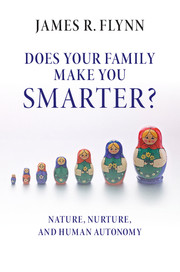Book contents
- Frontmatter
- Dedication
- Epigraph
- Contents
- List of figures, tables and boxes
- Acknowledgments
- Part I Human autonomy
- 1 Twins and autonomy
- 2 Justice and freedom
- 3 The great debate
- 4 Slow and quick decay of family effects
- 5 Reconciliation with twins and adoptions
- 6 The fairness factor
- Part II Intelligence
- For scholars who wish to use the Age-Table Method to measure family effects in nations other than the USA
- Appendix I Wechsler Vocabulary and description of method of analysis
- Appendix II Stanford-Binet Vocabulary
- Appendix III Raven's Progressive Matrices
- References
- Name index
- Subject index
1 - Twins and autonomy
from Part I - Human autonomy
Published online by Cambridge University Press: 05 June 2016
- Frontmatter
- Dedication
- Epigraph
- Contents
- List of figures, tables and boxes
- Acknowledgments
- Part I Human autonomy
- 1 Twins and autonomy
- 2 Justice and freedom
- 3 The great debate
- 4 Slow and quick decay of family effects
- 5 Reconciliation with twins and adoptions
- 6 The fairness factor
- Part II Intelligence
- For scholars who wish to use the Age-Table Method to measure family effects in nations other than the USA
- Appendix I Wechsler Vocabulary and description of method of analysis
- Appendix II Stanford-Binet Vocabulary
- Appendix III Raven's Progressive Matrices
- References
- Name index
- Subject index
Summary
Who is correct? Those who believe that our family history and decisions affect our cognitive abilities, or those who cite twin studies to show that our intelligence is largely the product of our genes? This is really a debate about the limits of human autonomy.
Until kinship studies began to partition IQ differences between people in terms of what proportion was due to their genetic differences and what proportion was due to their environmental differences, most people thought of themselves as individuals whose personal life history, and personal decisions, made them unique. That did not mean that genes could be ignored. I knew very well I did not have the genes to become a Mozart or an Einstein but, just as Graham Greene said “England made me,” I was convinced that my unique family history counted for what I was and that my personal decisions (to go to the University of Chicago rather than play it safe by going to the Catholic University of America) were significant.
It may be said, what could make you more uniquely yourself than your particular set of genes? But that is the problem: to lament your genes is to wish that you had been born a completely different human being. Genes cannot be personified in the image of yourself and your parents. You can love or hate your parents, be grateful or censorious about how they raised you, lament the injustice of a home in which poverty cheated you of advantages, exult in the freedom to choose your fate. The ownership of your unique past, present, and future is the essence of human autonomy. The ownership of your genes is kismet and the categories of justice and freedom do not apply, unless you upbraid God because you were born at all.
I am not trying to create a straw man. Those who think our inherited genes overwhelm environment in the development of our cognitive abilities do not deny that family is important in many respects. They concede that parents affect whether their kids hate other races, get a criminal record, or learn to slap their own children, and indeed, they concede that family can give children a head start for cognitive abilities that counts in school and university.
- Type
- Chapter
- Information
- Does your Family Make You Smarter?Nature, Nurture, and Human Autonomy, pp. 3 - 11Publisher: Cambridge University PressPrint publication year: 2016

